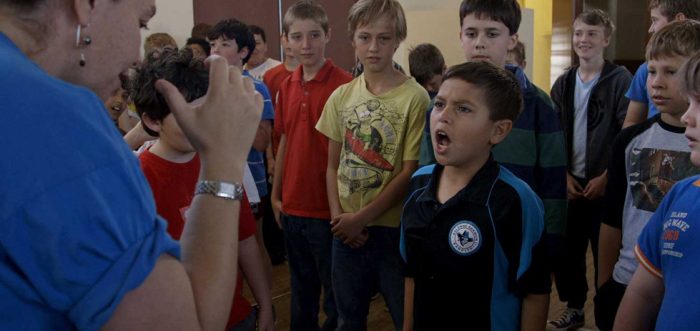
You might be forgiven for thinking that Wide Open Sky, the G-rated recipient of last year’s Sydney Film Festival Audience Award, is a light and breezy affair put into a wide theatrical release more for profitability than for quality. It’s true that the story of the formation of a choir of outback kids isn’t especially probing, and refrains from making any exhaustive points about Australian arts and primary education, however this ends up hardly being a problem. Lisa Nicol’s film touches on those issues just enough, while shooting in an accomplished style and giving its subjects ample space to honestly express themselves, to be worth seeing.
Wide Open Sky looks at the annual Moorambilla Voices program, which visits primary schools throughout rural New South Wales, finds talented young singers and gives them the chance to perform as part of a choir. The film focuses on a handful of the kids: Opal from Grawin lives on a dusty settlement with her parents, Mack from Lightning Ridge dances and sings in footy-mad Lightning Ridge, Kyhwin is another Ridge kid determined to attend high school in Sydney and Taylah stands apart in her large Brewarrina family with her love for music. All of them are handpicked to join the choir by the inimitable Michelle Leonard, who has been leading the project with infectious enthusiasm for eleven years. It’s apparent within seconds of her first appearance that she’s no hawkish talent judge, any hint of exploitation is decisively excised once we see her warm rapport with the students; it’s no accident that The X-Factor is referenced twice. “This is Moorambilla,” she says as a point of contrast, and you agree with her.
Moreover, Wide Open Sky isn’t some easy rejection of reality TV superficiality by Nicol (who wrote and produced the film as well). She has remarked that “one of [her] greatest aspirations for this film was to let [the kids] speak for themselves”, and that certainly comes to pass. Sometimes it’s for humour, like when a boy singer talks about packing his toiletries bag for choir camp with the kind of unjaded excitement adulthood takes away. Other times there’s a more emotionally involving intent. Through the interviews with the kids, volunteers and parents, it takes time to acknowledge that, on political and social levels, artistic disciplines are too often the first on the chopping block when money is tight. Watching Michelle hammer out melodies with the kids, which have been written by young composers like Alice Chance, is thorough proof of the value programs like these have for children’s learning and wellbeing, and with minimal narration and score, Nicol confidently allows this to be self-evident.
As the kids embark on a camp that introduces them to the demands of choir singing, editor Anna Craney cuts in a fashion that makes Michelle’s interactions with the kids clear, along with how she changes her teaching methods to suit different groups. She needs to stoke friendly competition among the boys, instil strength in the girls, and inspire wonder in those who might live too remotely to encounter it otherwise. These competing circumstances land thanks to a strong sense of time and place. The captured conversations between staff and campers are genuine and charming, and even within ABC broadcast-ready parameters, DP Carolyn Constantine shoots dusky vistas and the people in them with a pleasing eye.
There’s a particular point made by interview subjects and the production to highlight the value Moorambilla has for disadvantaged youth, girls and indigenous Australians. Kyhwin and Taylah both come from indigenous families (indeed, a third of all the participants are from an indigenous background) and female labour both in the program and the film itself is specifically highlighted. More than just a means through which to overcome the narrow-minded whimsy that can infect light-seeming docos, it’s a necessary step for a story on the disadvantage of rural locality to actually speak to those most in need of such opportunities. It does approach the ramifications of arts education programming gently, without speaking to anyone who might shed light on the allocation of funds for such programs (e.g. servants of the state government or anyone from a teaching body), though doing so would have run the risk of nullifying the film’s subtlety with over-complication, so it’s an acceptable minimisation.
There are small moments when the film overplays its hand. Watching Mack dance atop a tin roof to “I Dreamed a Dream” is wonderful, especially when hearing him speak about hiding his passion from classmates, but seeing the somewhat cavalier end titles refer to him as “the rooftop dancer” comes perilously close to the same cheap compartmentalising that The X-Factor revels in. It’s also perplexing to see entire teen and adult choirs show up in the booming final performance when we’ve spent the 80 minutes prior focused on the children’s achievements, with only scattered youth workers and composers seen among them. In these ways, the ending sees a brief trade of coherence for climax, but these are ultimately the smallest of blemishes on a simple, shining whole.
